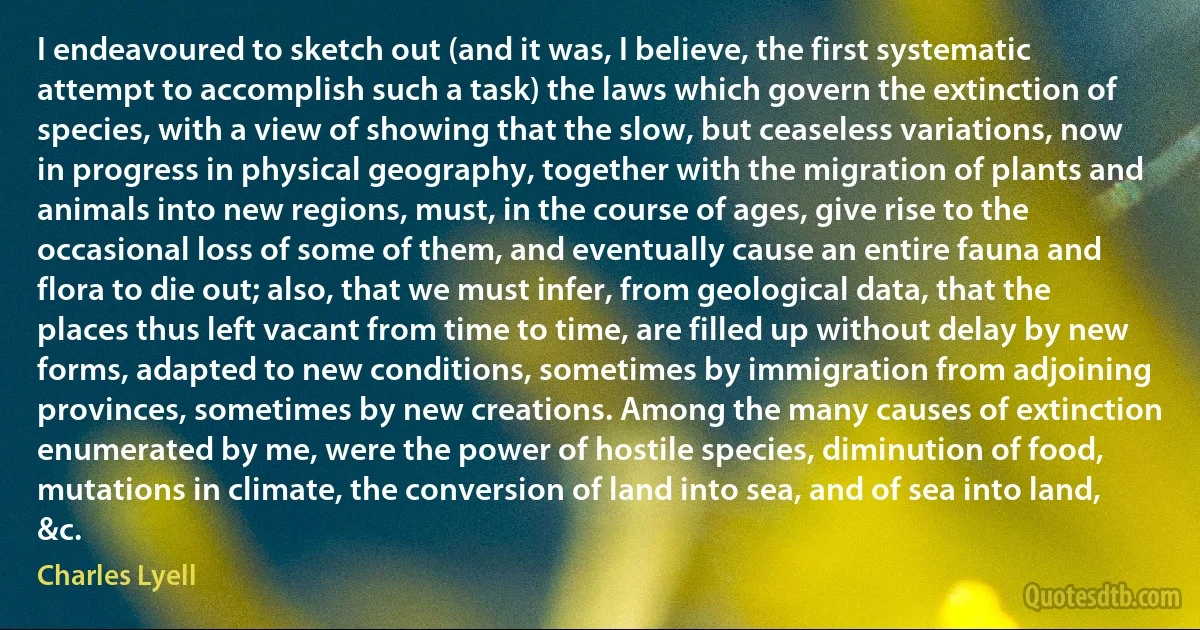Rise Quotes - page 81
I hope that our discussion of meaning-making and ethics-making has made it clear why we must stand firm in disputing god-talk: god-talk is at once a betrayal of our common humanity and a barrier to both meaning and ethics. That is not to say that you rise up in arms when you are visiting your parents' home for dinner and grace is said or that you leap into the fray every time you hear some piety uttered. No one has the time or the energy for such vigilance, and no one wants to become a pariah. But you do need to pick some fights and then fight them. If you are upholding values such as justice, reason, fairness, equity, and decency-if these inform the meaning and the ethics that you make-then you are obliged to stand up to god-talk at least occasionally.

Eric Maisel
I don't really care how time is reckoned so long as there is some agreement about it, but I object to being told that I am saving daylight when my reason tells me that I am doing nothing of the kind. I even object to the implication that I am wasting something valuable if I stay in bed after the sun has risen. As an admirer of moonlight I resent the bossy insistence of those who want to reduce my time for enjoying it. At the back of the Daylight Saving scheme I detect the bony, blue-fingered hand of Puritanism, eager to push people into bed earlier, and get them up earlier, to make them healthy, wealthy and wise in spite of themselves.

Robertson Davies
Due to their parents' straitened circumstances, the youths [Rembrandt and Jan Lievens, living in Leiden, then] were compelled to take teachers whose fees were modest. Were these teachers to be confronted with their pupils today, they would feel just as abashed as those teachers who gave Virgil his first lessons in poetry, Cicero in rhetoric and Archimedes in mathematics. Let it however be said, with due respect for everyone's capacities and without detracting from anyone (for what is it to me?): these two owe nothing to their teachers but everything to their aptitude. Had they never received any tuition but been left to their own devices and suddenly been seized by the urge to paint, I am convinced that they would have risen to the same heights as they indeed have. It would be wrong to think that others have led them to this point.

Rembrandt
No one, of a surety, wanders farther from the mark than he who fancies to himself that he already understands this marvellous Kingdom, and can, in few words, fathom its constitution, and everywhere find the right path. To no one, who has broken off, and made himself an Island, will insight rise of itself, nor even without toilsome effort. Only to children, or childlike men, who know not what they do, can this happen. Long, unwearied intercourse, free and wise Contemplation, attention to faint tokens and indications; an inward poet-life, practised senses, a simple and devout spirit: these are the essential requisites of a true Friend of Nature; without these no one can attain his wish.

Novalis
Bad science contributes to the steady dumbing down of our nation. Crude beliefs get transmitted to political leaders and the result is considerable damage to society. We see this happening now in the rapid rise of the religious right and how it has taken over large segments of the Republican Party.

Martin Gardner
I remember one time we pitched out on him and he hit a homer, right into the right-field corner. Billy McCool was our pitcher. Roberto just reached out and belted the homer. He could do everything on the field. If he didn't kill you with his bat, arm or glove, he'd do it on the basepaths, taking the extra base. And he always seemed to rise to the occasion.

Roberto Clemente
Alfred Nobel believed that the destructiveness of dynamite would put an end to war. He deeply believed that the tragic reality of mass carnage would achieve results which all the preaching of peace and goodwill had so far failed to achieve. His prophecy now must gain fulfillment. Recoiling from the abyss of nuclear extermination, the human family will finally abandon war. May we learn from barbaric and bloody deeds of the twentieth century and bestow the gift of peace to the next millennium. Perhaps in that way we shall redeem some measure of respect from generations yet to come. Having achieved peace, in the sonorous phrase of Martin Luther King, Jr. spoken here twenty-one years ago, human beings will then "rise to the majestic heights of moral maturity".

Bernard Lown
Lords of themselves and leaders of mankind.On equal rights their base of empire lies,
On walls of wisdom see the structure rise;
Wide o'er the gazing world it towers sublime,
A modell'd form for each surrounding clime.
To useful toils they bend their noblest aim,
Make patriot views and moral views the same,
Renounce the wish of war, bid conquest cease,
Invite all men to happiness and peace,
To faith and justice rear the youthful race,
Till Truth's blest banners, o'er the regions hurl'd,
Shake tyrants from their thrones, and cheer the waking world.

Joel Barlow
Man is not entirely an animal. He aspires to a spiritual vision, which is the vision of the whole truth. This gives him the highest delight, because it reveals to him the deepest harmony that exists between him and his surroundings. It is our desires that limit the scope of our self-realisation, hinder our extension of consciousness, and give rise to sin, which is the innermost barrier that keeps us apart from our God, setting up disunion and the arrogance of exclusiveness. For sin is not one mere action, but it is an attitude of life which takes for granted that our goal is finite, that our self is the ultimate truth, and that we are not all essentially one but exist each for his own separate individual existence.

Rabindranath Tagore
I was convinced that Lake Como was a large basin of water similar to the Tahoe, also surrounded by immense mountains whose slopes reach the shores, but here the lake is not a basin, since the banks are articulated like those of a stream and is a quarter or two thirds wide of the Mississippi. Along the coast there is not a single strip of flat land, but endless chains of mountains which suddenly emerge from the lake surface and rise towards the sky for one hundred or two hundred feet, constantly varying in shape. The rocky ridges are covered with numerous plant species and dotted with white villas that peek through lush foliage. Even on the top of the promontory we saw pretty little houses perched on picturesque pinnacles, more than a thousand feet above our heads.

Mark Twain
I feel in my sinews
The spreading of shadows
Converging together
With a shiver
And in solitary vigil
After flights triumphal
My head rise
From this scythe
Through a clean rupture
That serves to dissever
The ancient disharmony
With the body
As drunk from fasting
It persists in following
With a haggard bound
Its gaze profound
Up where the frozen
Absolute has chosen
That nothing shall measure
Its vastness, O glacier
But according to a ritual
Illumined by the principle
That chose my consecration
It extends a salutation.

Stéphane Mallarmé
The non-evaluative general total conception of ideology is to be found primarily in those historical investigations, where, provisionally and for the sake of the simplification of the problem, no judgments are pronounced as to the correctness of the ideas to be treated. This approach confines itself to discovering the relations between certain mental structures and the life-situations in which they exist. We must constantly ask ourselves how it comes about that a given type of social situation gives rise to a given interpretation. Thus the ideological element in human thought, viewed at this level, is always bound up with the existing life-situation of the thinker. According to this view human thought arises, and operates, not in a social vacuum but in a definite social milieu.

Karl Mannheim
The primordial forms of all sciences, taken back beyond the rise of writing, lie ultimately in the magic of prehistory. Just as modern man wants to indicate what consequences his actions will have, so also a man who grows up in the magical way of life seeks to find a ground for everything and to find consequences of his action. Magic as a more or less clearly formulated system of tenets shot through with emotional elements, can become independent only when magicians, acting as specialists, proclaim the consequences of certain customs, either esoterically,. e.g. at certain rituals, or exoterically as popular education. The magicians tell what cases are to count as 'equal', and when certain measures shall be used (if we think them ineffective, we call them ceremonies).

Otto Neurath
The choice is between two ways of life: between individual liberty and State domination; between concentrations of ownership in the hands of the State and the extension of ownership over the widest number of individuals; between the dead hand of monopoly and the stimulus of competition; between a policy of increasing restraint and a policy of liberating energy and ingenuity; between a policy of leveling down and a policy of opportunity for all to rise upwards from a basic standard.

Winston Churchill
Solemnly seemest like a vapoury cloud
To rise before me - Rise, oh, ever rise;
Rise like a cloud of incense from the earth!
Thou kingly spirit throned among the hills,
Thou dread ambassador from earth to heaven,
Great hierarch! tell thou the silent sky,
And tell the stars, and tell yon rising sun,
Earth, with her thousand voices, praises God.

Samuel Taylor Coleridge
[T]he nineteenth century was under the illusion that citizenship can take care of itself. It thought that a free society was "natural" and... would maintain itself by its own momentum. ..."[A]utomatic progress" would preserve liberty. ...[T]hese beliefs were false... they were destructive. They are not... the source and origin of Hitlerism, but they greatly facilitated its rise.

Peter Drucker



